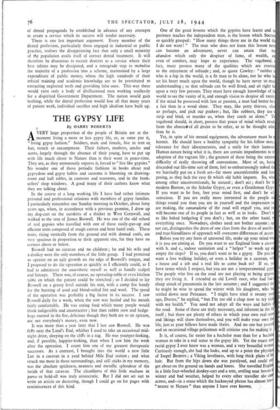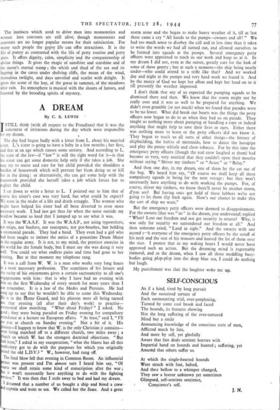THE GYPSY LIFE
By HARRY ROBERTS
AVERY large proportion of the people of Britain are at the moment living a more or less gypsy life, or, as some put it, " living gypsy fashion." Soldiers, male and female, live in tent or,
hut, trench or encampment. Their fathers, mothers, uncles and aunts, largely through the absence of their young, have to put up with life much closer to Nature than is their wont in peace-time. They are, as they erroneously express it, forced to " live like gypsies." No wonder one of those periodic fashions in books about real gypsydom and gypsy habits and customs is blooming on drawing- room and hall tables, in canteens and tearooms, and in the book- sellers' shop windows. A good many of their authors know what they are talking about.
In the course of a long working life I have had rather intimate personal and professional relations with members of gypsy families. I particularly remember one Sunday morning in October, about forty years ago, when, in accordance with a previous promise, I drew up • my dog-cart on the outskirts of a thicket in West Cornwall, and walked to the tent of James Boswell. He was one of the old school of real gypsies who travelled with one of those easily-put-up and efficient tents composed of rough canvas and bent haiel rods. These tents, rising vertically from the ground and with domed roofs, are very spacious in proportion to their apparent size, for they have no corners above or below.
Boswell had no caravan and no children ; he and his wife and a donkey were the only members of the little group. I had promised to operate on an ugly growth on the edge of Boswell's tongue, and I proposed to do the operation as quickly as I efficiently could, as I had to administer the anaesthetic myself as well as handle scalpel and forceps. There was, of course, no operating-table or even kitchen table on which the patient could be stretched ; so I decided to lay Boswell on a grassy level outside his tent, with a camp fire handy for the burning of used and blood-soiled lint and wool. The speed of the operation was probably a big factor in its success. I saw Boswell daily for a week, when the sore was healed and his mouth fairly comfortable. He was eating food which many people would think indigestible and unattractive ; but then rabbit stew and hedge. hogs roasted in the fire, delicious though they both are to an epicure, are not everybody's money, even now.
It was more than a year later that I last saw Boswell. He was thPn near the Land's End, whither I used to take an occasional mid- night drive, sleeping on the cliffs in a rug. He was younger-looking, and, if possible, happier-looking, than when I saw him the week after the operation. I count him one of my greatest therapeutic successes. As a contrast, I brought into the world a new little Lee in a caravan in a yard behind Mile End station ; and what struck me most in those surroundings, and still sticks in my memory, was the absolute spickness, nearness and metallic splendour of the inside of that caravan. The cleanliness of this little mu/tum in parvo or hold-all was truly aristocratic. But I did not set out to write an article on doctoring, though I could go on for pages with reminiscences of this kind. One of the great lessons which the gypsies have learnt and perience teaches the independent man, is the lesson which Socra so quickly grasped : "How many things there are in the world I do not want! " The man who does not learn this lesson nev can become an adventurer, never can attain that abandon which only the despiser of fame, of wealth, even of comfort, may hope to experience. The vagabond, fact, must possess many of the qualities which are essen to the enjoyment of solitude ; and, to quote Cowley : " neither who is a fop in the world, is a fit man to be alone, nor he who set his heart much upon the world, though he have never so m understanding ; so that solitude can be well fitted, and sit right upon a very few persons. They must have enough knowledge of world to see the vanity of it, and enough vision to despise all vanity if the mind be possessed with lust or passion, a man had better be a fair than in a wood alone. They may, like petty thieves, ch us perhaps, and pick our pockets ; brit, like robbers, they use strip and bind, or murder us, when they catch us alone." vagabond should, in short, possess that peace of mind which res from the absenciof all desire to be other, or to be thought o than he is.
Yet, in spite of his mental equipment, the adventurer must be hermit. He should have a healthy sympathy for his fellow men, tolerance for their idiosyncrasies, and a smile for their humo Human nature being what it is, there are certain impediments to adoption of the vagrant life ; the greatest of these being the extr difficulty of really throwing off conventions. Most of us, hay' discarded our life-time suit of them, feel so embarrassingly naked we hurriedly put on a fresh set—far more uncomfortable and pering, as they lack the easy fit which old habit imparts. So, wh among other unconventionals, be natural ; don't act ; don't be modern Borrow, or the Scholar Gypsy, or even a Gentleman Gypsy. If you want to be free, free your mind first, and don't be sell conscious. If you are really more interested in the people a things round you than you are in yourself and the impression ) are making, the camaraderie of the road will engulf you, and ) will become one of its people in fact as well as in looks. Don't t. to like baked hedgehog if you don't ; but, on the other hand, everything once. Nowadays, clothes need not bother anyone ; ag not cut, distinguishes the dress of one class from the dress of another and true friendliness of approach will overcome differences of accent
Before you try any form of unrooted life, make up your mind wh it is you are aiming at. Do you want to see England from a carav with h. and c., indoor sanitation and a " helper " to wash up empty the slops? If so, you don't want to be a gypsy. Do you want a free walking holiday, or even a holiday in a caravan, lin a house and a job and a real life to come back to? If so, have tastes which I respect, but you are not a temperamental gyp The people who live on the road are not playing at being gyps they are living it. I attended an old Lovell once, who had had sharp attack of pneumonia in the late autumn ; and I suggested di he might be wise to spend she winter with his daughter, who h settled down near Penzance. " I might have tried it twenty ye ago, Doctor," he replied, " but I'm too old a chap now to try tri with my health." You need not adopt all the ways and habits the road. Some of these are truly necessary, and inherent in the lilt itself ; but there are plenty of others in which your own real taste, and likings will show themselves, and you will make your own fir• life, just as your fellows have made theirs. And no one but yours and an occasional village policeman will criticise you for making it.
It is, of course, far easier for a bachelor man than for a bath woman to take in a real sense to the gypsy life. Yet the truest n racial gypsy I ever knew was a woman, and a very beautiful won, Curiously enough, she had the looks, and up to a point the physi of Isopel Berners ; a Viking loveliness, with long thick plaits of hair. But from the hips down she was paralysed, and could get about on the ground on hands and knees. She travelled Engl in a little four-wheeled donkey-cart and a tent, settling near houses winter and bad weather, helped by every other traveller she across, and—in a sense which the hackneyed phrase has almost log "nearer to Nature" than anyone I have ever known. The instincts which used to drive men into monasteries and women into convents are still alive, though monasteries and convents are no longer popular means for their satisfaction. For many such people the gypsy life can offer attractions. It is the life of poetry as contrasted with the life of petty routine and petty aims. It offers dignity, calm, simplicity and the companionship of divine things. It gives the magic of sunshine and starshine and of the moon's eternal tramp ; the whish and thud of the sea and its lapping in the caves under shelving cliffs, the moan of the wind, tremulous twilight, and days unveiled and scarlet with delight. It gives the scent of the hay, of the gorse in summer, of the meadows after rain. Its atmosphere is musical with the shouts of heroes, and haunted by the brooding spirits of mystery.



























 Previous page
Previous page